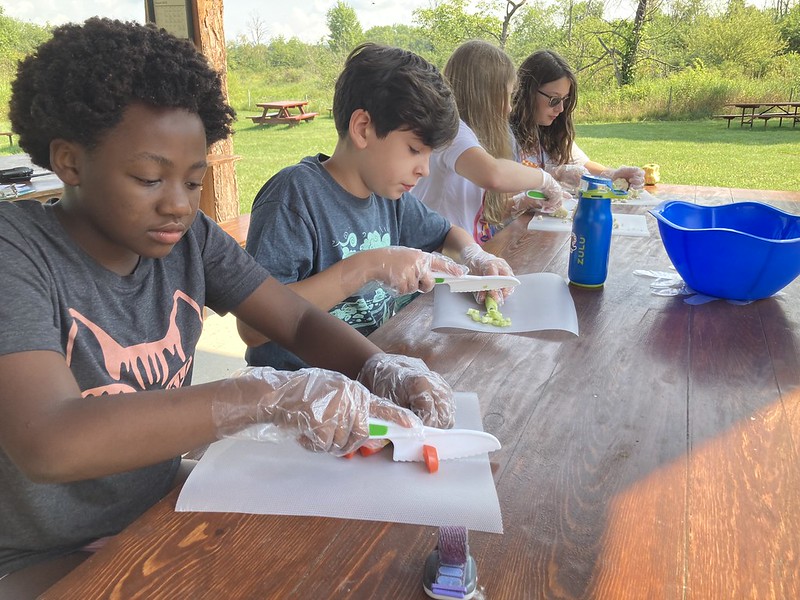By Katie Finch
Audubon Community Nature Center’s (ACNC) mission, in part, is to build and nurture connections between people and nature. There are a lot of ways to connect to the natural world. It can happen through physical activities such as walking, biking, paddling, or playing. We also connect through observing the natural world when we go birding, take photos, or do other nature study. Others tend and steward the land in a garden, forest, or landscape.
There may be no stronger connection to nature than through the food we eat. Plants, animals, and fungi fuel our bodies. They are critical to our growth and health. We cannot live without them. It is easy to separate ourselves from our reliance on other living things when they come wrapped in plastic and highly processed. But food can also be so much more when we are fortunate enough to grow, harvest, cook, and eat it.
At ACNC, the kitchen garden is a favorite destination among summer day campers. It is a place where campers can experience plants with all their senses. They crush and smell herbs, like lemon basil and pineapple sage. They eagerly pick and taste whatever is ready — kale, peas, and tomatoes. Even the spicy nasturtium flowers get eaten. And there is a satisfying crunch heard when breaking a fresh green bean or the perfectly ripe snap pea.

These sensory experiences lead to questions and stories. Why are the zucchini leaves so prickly? This plant smells like my grandma’s kitchen. Who likes the taste of the bronze fennel? What does a carrot look like underground?
Even though the kitchen garden is created by people, it can teach us that things are not always about us. Plants have their own pace and own season. There is disappointment to only finding unripe tomatoes or tiny cucumbers when you really want to eat them. But patience is a practice. Not all wants can be met immediately.
There are others who share this space. The sign on the garden gate encourages visitors to taste the plants, take what they need and leave some for others, even the non-human ones. Bumblebees and Hummingbird Moths buzz around the Bee Balm flowers. Worms and beetles crawl through the soil. And something got into the fenced-in space and ate the tops off all the broccoli.
This past week, a group of summer campers went beyond the regular garden grazing. In the Wild Kitchen camp, they harvested both garden and wild plants to cook. They chopped herbs to mix into butter, which was spread over fire-roasted bread. They measured and mixed ingredients for quick pickles. And they learned to identify several wild edible plants to forage as garnish for salad.
I was able to witness campers build a connection to nature through food. Engaged in all their senses, working with what was seasonally available, and determining what flavors and textures they liked, we had a blast!
Food experienced in this way connects us to nature. It is also a source of great joy and creativity. It builds necessary skills and abilities. To identify clover and violet leaves among all the other green plants on the ground requires attention to detail. Caring for the tools and equipment, including washing dishes, fosters respect and responsibility. We used more math while following recipes than any camper expected or probably realized. These skills, along with the confidence and kindness that comes from harvesting your own food is also critical to our survival.

Knowing first-hand the work that goes into a garden, I want to recognize ACNC’s garden volunteers. We have a kitchen garden, and other gardens around the nature center, because they share their knowledge and time. Many gardens are planned, planted, and maintained by volunteers. Without their generosity, we wouldn’t have this resource available for programs and visitors. The garden is open for visitors to taste the variety of herbs, vegetables, and edible flowers ripe throughout the growing season.
I have a vegetable garden at home because it helps me nurture a connection to nature, practice patience, generosity, and joy. But I think the most important thing that can happen in a garden is the continual development of our sense of wonder. For example, we can plant a seed that looks like nothing at all. With soil, water, sun, and time, it can not only feed us, but create another seed to recreate itself.
A garden is a wonderful gift to share with others. In my vegetable garden at home, my 11-year-old nephew paused while picking green beans for dinner and said “Isn’t nature just amazing?”. Yes, it most certainly is.
Audubon Community Nature Center builds and nurtures connections between people and nature. ACNC is located just east of Route 62 between Warren and Jamestown. The trails are open from dawn to dusk and birds of prey can be viewed anytime the trails are open. The Nature Center is open from 10 a.m. until 4:30 p.m. daily except Sunday when it opens at 1 p.m. More information can be found online at auduboncnc.org or by calling (716) 569-2345.
Katie Finch is Senior Nature Educator at ACNC.


Recent Comments